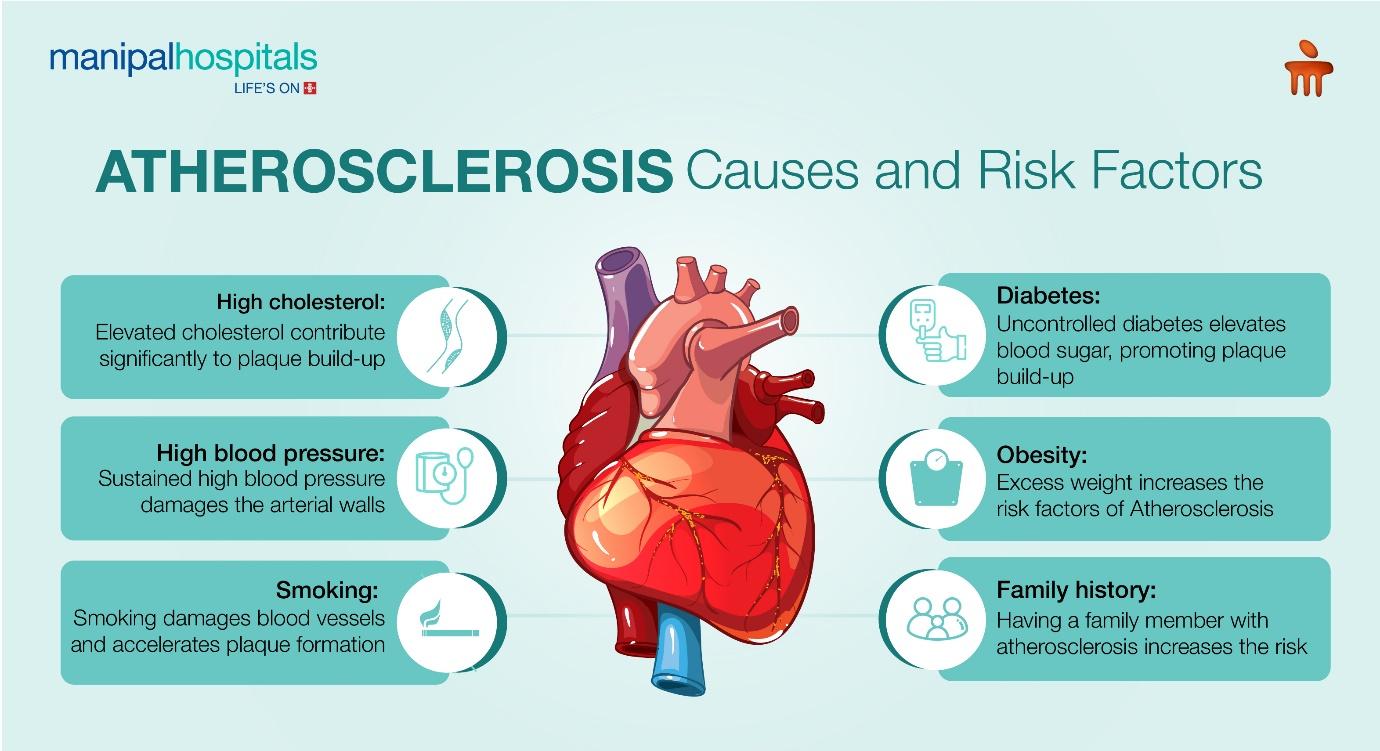
Atherosclerosis, often referred to as hardening of the arteries, is a progressive and potentially life-threatening condition that affects millions worldwide. This silent disease stealthily builds up fatty deposits, called plaque, within the walls of arteries, narrowing and stiffening them, ultimately restricting blood flow to vital organs.
Synopsis
What is Atherosclerosis?
While atherosclerosis and heart disease often progress silently, their impact can be profound. Restricted blood flow to the heart can lead to chest pain (angina), shortness of breath, and ultimately, heart attacks. When arteries supplying the brain are affected, strokes can occur, causing sudden neurological impairments. Reduced blood flow to the legs can result in intermittent claudication, causing pain and limiting mobility. Atherosclerosis can also affect other organs, leading to complications like kidney failure and erectile dysfunction.
How Does Atherosclerosis Impact Lives?
The consequences of atherosclerosis can be devastating, impacting various aspects of life:
- Heart Disease: Reduced blood flow to the heart can lead to angina (chest pain), heart attack, and heart failure.
- Stroke: When plaque blocks blood flow to the brain, it can cause a stroke, resulting in paralysis, speech difficulties, and cognitive impairment.
- Peripheral Artery Disease (PAD): Narrowed arteries in the legs can cause leg pain, cramping, and even tissue death in severe cases.
- Kidney Failure: Reduced blood flow to the kidneys can impair their function, leading to kidney failure and the need for dialysis.
Symptoms to Watch Out for
Unfortunately, atherosclerosis often progresses silently until a blockage occurs, triggering symptoms based on the affected artery. Common signs include:
- Chest pain or discomfort (Angina): Pressure, tightness, or squeezing sensation in the chest, often brought on by exertion or emotional stress.
- Shortness of breath: Difficulty breathing, especially during physical activity.
- Pain in the legs or arms: Cramping or aching pain, particularly when walking (PAD).
- Numbness or tingling in the extremities: Difficulty speaking, slurred speech, loss of vision, sudden numbness or drooping muscles in the face.
Seek medical attention promptly if you experience any signs of potential blockages.
Causes and Risk Factors

While the exact cause remains under investigation, several factors contribute to atherosclerosis development:
- High Cholesterol: Elevated levels of LDL ("bad") cholesterol contribute significantly to plaque build-up.
- High Blood Pressure: Sustained high blood pressure damages the arterial walls, making them more prone to plaque accumulation.
- Smoking: Smoking damages blood vessels and accelerates plaque formation.
- Diabetes: Uncontrolled diabetes elevates blood sugar, promoting inflammation and plaque build-up.
- Obesity: Excess weight increases the risk factors mentioned above.
- Family History: Having a family member with atherosclerosis increases your risk.
Diagnosing and Combating the Threat
Before planning atherosclerosis treatment, an early diagnosis is crucial for preventing severe complications. An experienced heart specialist in Vijayawada may consider the below process:
- Blood tests: To assess cholesterol levels, blood sugar, and inflammatory markers.
- Imaging tests: X-rays, CT scans, and ultrasounds to visualise arteries and blockages.
- Ankle-brachial Index (ABI): Compares blood pressure in the arms and legs to assess PAD.
- Examinations: Your healthcare professional can opt for a complete physical examination to assess the extent of the condition.
Atherosclerosis Treatment
- Lifestyle changes: A healthy diet, regular exercise, smoking cessation, and weight management are crucial.
- Medications: Cholesterol-lowering drugs, blood pressure medications, and antiplatelet drugs may be prescribed.
- Procedures: In severe cases, procedures like angioplasty and stenting may be used to open blocked arteries.
Atherosclerosis may be a silent threat, but you don't have to be a silent victim. You can empower yourself by understanding the risks, recognising the symptoms, and prioritising preventive measures, to live a heart-healthy life. If you are experiencing any symptoms or are at a high risk of this condition, it is advised to consult with a healthcare provider at Manipal Hospitals Vijayawada about your risk factors and create a personalised plan to keep your arteries clear and your heart pumping strongly.
FAQ's
Atherosclerosis often progresses silently without symptoms until a blockage occurs. However, some subtle signs might include fatigue, easily windedness, or mild discomfort in the affected area (chest for heart, legs for PAD).
While reversal in the literal sense might not be possible, you can slow or even halt its progression through healthy lifestyle changes and medical interventions. Early diagnosis and proactive management are key to minimising damage and preventing complications.
There's no single "Atherosclerosis diet," but focusing on a heart-healthy plan is key. This includes minimizing saturated and trans fats, reducing red meat intake, and prioritising fruits, vegetables, whole grains, and lean protein sources.
Screening frequency depends on your risk factors, age, and overall health. Discuss with your doctor how often screenings like blood tests, imaging, or ABI tests are recommended for you based on your specific situation.
Untreated Atherosclerosis can lead to serious consequences like heart attack, stroke, peripheral artery disease, kidney failure, and even limb amputation. However, through early detection and management, these complications can often be prevented or significantly minimised.



















 3 Min Read
3 Min Read









.png)





